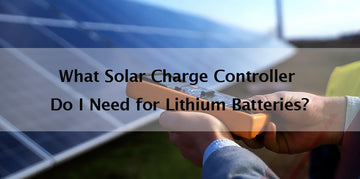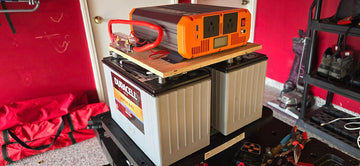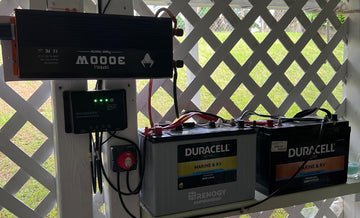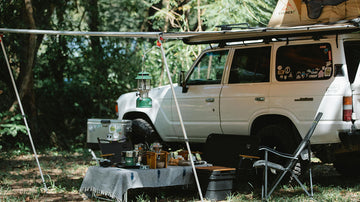In recent years, lithium batteries have gained popularity due to their higher energy density, lighter weight and low self-discharge rate. Due to their longer life and lower maintenance requirements, lithium batteries are widely used in solar energy devices. In order to maximise the utility and longevity of lithium batteries, solar charge controllers become critical. This is because lithium batteries require special care during charging and discharging. Failure to use a compatible solar charge controller can lead to a rapid decline in battery performance and may even pose a safety risk.
In this article you'll learn the basics of solar charge controllers, when to use them and how to choose the best solar battery charger for your system.
What is solar charge controller
Solar charge controllers control the flow of electrical energy to the battery, ensuring that the battery is charged in an appropriate manner to avoid overcharging or over-discharging. This ensures that the system operates within the optimum voltage range, reducing power conversion losses and improving overall efficiency. Lithium batteries require 14.4 volts to charge. The output voltage of the solar panel can be 18 volts. The solar charge controller converts the 18 volts to 14.4 volts to ensure optimum charging of the lithium battery. This is considered an efficiency gain from a voltage perspective. Solar charge controllers can be divided into the following categories according to their function:
1️⃣General solar controller
Ordinary solar controllers are typically used for basic PV systems to monitor and manage the operation of the system.
2️⃣Rechargeable solar controller
Rechargeable solar charge controllers mainly realise the charging and protection functions of the battery and are suitable for small solar lighting systems, remote communication and so on.
3️⃣Integrated solar controller
Integrated solar controller with both charge and discharge functions, suitable for large solar panels and battery systems, more convenient to use.
4️⃣Solar charge and discharge controller
Solar charge/discharge controller is to combine the charge and discharge function into one, mainly applicable to some small power solar products.
Solar controllers can also be classified according to different charging and discharging methods:
1️⃣Conventional PWM charge control mode
Uses pulse modulation technology to control charging, ensuring that the solar panel voltage is slightly higher than the charging voltage, suitable for smaller systems and relatively low cost.
2️⃣MPPT tracking charge control mode
Achieves charge control through Maximum Power Point Tracking technology, adjusting the solar panel voltage to match the voltage used by the battery to maximise the efficiency of solar energy use.
3️⃣Conventional low voltage cut-off mode
When the charging voltage reaches the set value, it automatically disconnects the battery to prevent overcharging and protect the battery from damage.
4️⃣Voltage protection mode
Automatically disconnects the load when the voltage falls below the set value to prevent over-discharging and protect the battery from damage.
See more: PWM vs MPPT Solar Charge Controllers: Which Is for You
When do I need a charge controller?
Smaller solar panels of 50 watts and below typically have a lower power output. These small panels can be connected directly to the battery for charging without the need for an additional charge controller. This simple connection is suitable for simple applications such as charging small lamps or electronic devices.
If your solar panels are 100 watts or larger, you'll need a charge controller to increase efficiency, especially in permanent systems where panels and batteries are installed for long periods of time. A controller ensures that the charging circuitry manages the batteries properly, preventing overcharging and over-discharging and extending battery life.
For systems with 200 watts or more of solar power, a solar charge controller is a must. Solar charge controllers are particularly important for off-grid systems and mobile vehicles. These systems often need to operate independently for long periods of time, so the installation of a controller is critical to maintaining system stability and reliability.
The most suitable solar charge controller for lithium batteries
The most suitable solar charge controller for Li-ion batteries is the MPPT solar charge controller. The MPPT solar charge controller is an improved version of the PWM type, which is ideal for complex solar control systems and is the best choice for lithium-ion batteries.
MPPT solar charge controllers are able to regulate the current and voltage of the solar panels in real time using complex algorithms to ensure that the system is operating at the point of maximum power output. This helps to maximise the output of the solar panels and improve system efficiency. It is highly adaptable to different weather conditions, light levels and temperature variations, ensuring optimal system performance in all environments.
Such controllers are usually equipped with multiple protection functions, such as overcharge protection, overdischarge protection and short circuit protection, to ensure that lithium-ion batteries are effectively protected during the charging process and to extend battery life. At the same time, MPPT controllers are usually equipped with intelligent management functions to monitor system status, record data and provide remote monitoring and control options to make system management more convenient and efficient.
What size solar charge controller do I need?
To determine the size of solar charge controller you need, find out the maximum current rating of your solar panel. You will need a controller with a higher current rating than the solar panel. For example, if you have a 300 watt solar panel with a maximum output current of 15 amps, you will need a controller with a 15 amp input. The most common controller sizes are 15A, 30A, 50A and 100A. Below are some of the most common marine and RV solar panel sizes and the required solar charge controller size.
| Solar Panel Size | Solar charge ontroller size | lithium battery size |
| <50W solar panel | No controller required | 12V 25Ah lithium battery |
| 100W solar panel | 12V 15A controller | 12V 100Ah lithium battery |
| 200W solar panel | 12V 15A controller | 12V 100Ah lithium battery |
| 300W solar panel | 12V 15A x 2 or 12V 30A | 12V 200Ah lithium battery |
For every additional 300W of solar panels, the capacity of the solar charge controller must be increased by 15A and the capacity of the lithium battery must be increased by 100Ah.
In addition to size there are also considerations:
Safety performance
Pay attention to the safety performance, because the solar controller can also fail, pay attention to the short circuit protection, reverse polarity protection and overcharge protection and other safety features, to protect our personal life and health safety and the safety of solar power system.
Price factor
PWM controllers are relatively cheap, while MPPT controllers are usually more expensive. Weigh them up according to your personal needs, budget and solar system size to choose the most suitable controller.
Function factor
As some solar controllers have different functions with temperature compensation function or remote monitoring function, we can keep a close eye on the operating status through smart devices to ensure safety.
Climatic environment factor
Depending on where you install the solar system, the local climate environment will affect the operation status, if the local climate has a large influence factor on the solar panels, it is recommended to choose MPPT solar charge controller. If the climatic environment has less influence on the solar panels, you can choose PWM solar charge controller.
Should I use one or two charge controllers?
Using one or two controllers will not change the efficiency of the system. Just make sure that the total amperage of the controller is less than the total amperage of the solar panel. For solar panels producing <15 amps, you only need one. For systems that produce more than 15 amps, it may be strategic to use more than one controller. The reason for this is redundancy. If one controller fails, you still have 50% of the system running.
Use a charge controller
- Small systems: For small solar systems, a single charge controller may be sufficient, simplifying system design.
- Cost-effective: A single charge controller is often more cost effective than multiple controllers.
- Simplified installation: A single controller can reduce installation complexity and maintenance costs.
Use two charge controllers
- Multi-cell system: If you have a system consisting of multiple cells, each requiring independent charge control, multiple controllers may be required.
- System zoning: If the solar panels are distributed in different zones and each zone requires independent control, consider using multiple controllers.
- Redundancy and reliability: Using multiple controllers provides redundancy, where if one controller fails, the other can continue to operate, increasing system reliability.













